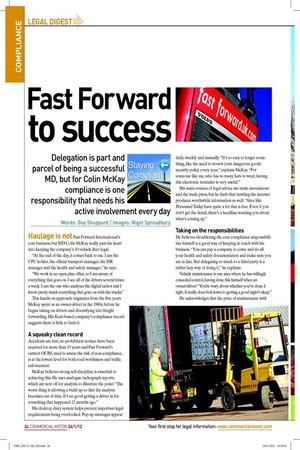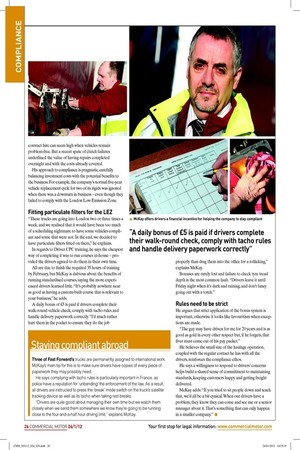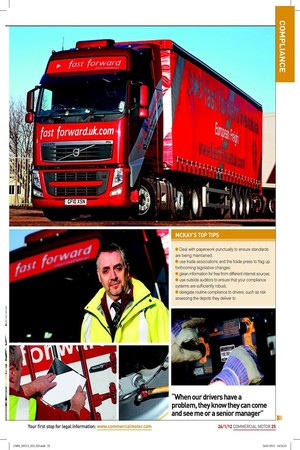Fast Forward
Page 18

Page 20

Page 19

If you've noticed an error in this article please click here to report it so we can fix it.
to success
Delegation is part and parcel of being a successful MD, but for Colin McKay compliance is one responsibility that needs his active involvement every day
Words: Guy Sheppard / Images: Nigel Spreadbury Haulage is not Fast Forward International’s core business, but MD Colin McKay really puts his heart into keeping the company’s 10-vehicle leet legal.
“At the end of the day, it comes back to me. I am the CPC holder, the oficial transport manager, the HR manager and the health and safety manager,” he says.
“We work in an open plan ofice, so I am aware of everything that goes on. I see all of the drivers several times a week. I am the one who analyses the digital tachos and I know pretty much everything that goes on with the trucks.” This hands-on approach originates from the ive years McKay spent as an owner-driver in the 1980s, before he began taking on drivers and diversifying into freight forwarding. His Kent-based company’s compliance record suggests there is little to fault it.
A squeaky clean record
Accidents are rare, no prohibition notices have been received for more than 10 years and Fast Forward’s current OCRS, used to assess the risk of non-compliance, is at the lowest level for both road worthiness and trafic enforcement.
McKay believes strong self-discipline is essential to achieving this. He uses analogue tachograph reports, which are sent off for analysis, to illustrate the point: “The worst thing is allowing a build up so that the analysis becomes out of date. It’s no good getting a driver in for something that happened 12 months ago.” His desktop diary system helps prevent important legal requirements being overlooked. Pop-up messages appear daily, weekly and annually. “It’s so easy to forget something, like the need to review your dangerous goods security policy every year,” explains McKay. “For someone like me, who has so many hats to wear, having this electronic reminder is very useful.” His main sources of legal advice are trade associations and the trade press, but he inds that trawling the internet produces worthwhile information as well. “Sites like Personnel Today have quite a lot that is free. Even if you don’t get the detail, there’s a headline warning you about what’s coming up.”
Taking on the responsibilities
He believes shouldering the core compliance responsibilities himself is a good way of keeping in touch with his business. “You can pay a company to come and do all your health and safety documentation and make sure you are in line. But delegating so much to a third party is a rather lazy way of doing it,” he explains.
Vehicle maintenance is one area where he has willingly conceded control, having done this himself when an owner-driver: “You’re wary about whether you’ve done it right. It really does boil down to getting a good night’s sleep.” He acknowledges that the price of maintenance with contract hire can seem high when vehicles remain problem-free. But a recent spate of clutch failures underlined the value of having repairs completed overnight and with the costs already covered.
His approach to compliance is pragmatic, carefully balancing investment costs with the potential beneits to the business. For example, the company’s normal ive-year vehicle replacement cycle for two of its rigids was ignored when there was a downturn in business – even though they failed to comply with the London Low Emission Zone.
Fitting particulate filters for the LEZ
“These trucks are going into London two or three times a week, and we realised that it would have been too much of a scheduling nightmare to have some vehicles compliant and some that were not. In the end, we decided to have particulate ilters itted on them,” he explains.
In regards to Driver CPC training, he says the cheapest way of completing it was to run courses in-house – provided the drivers agreed to do them in their own time.
All are due to inish the required 35 hours of training by February, but McKay is dubious about the beneits of running standardised courses, saying the more experienced drivers learned little. “It’s probably nowhere near as good as having a custom-built course that is relevant to your business,” he adds.
A daily bonus of £5 is paid if drivers complete their walk-round vehicle check, comply with tacho rules and handle delivery paperwork correctly. “I’d much rather hurt them in the pocket to ensure they do the job properly than drag them into the ofice for a rollicking,” explains McKay.
Bonuses are rarely lost and failure to check tyre tread depth is the most common fault. “Drivers leave it until Friday night when it’s dark and raining, and don’t fancy going out with a torch.”
Rules need to be strict
He argues that strict application of the bonus system is important, otherwise it looks like favouritism when exceptions are made.
“The guy may have driven for me for 20 years and is as good as gold in every other respect but, if he forgets, that iver must come out of his pay packet.” He believes the small size of the haulage operation, coupled with the regular contact he has with all the drivers, reinforces the compliance ethos.
He says a willingness to respond to drivers’ concerns helps build a shared sense of commitment to maintaining standards, keeping customers happy and getting freight delivered.
McKay adds: “If you tried to sit people down and teach that, we’d all be a bit cynical. When our drivers have a problem, they know they can come and see me or a senior manager about it. That’s something that can only happen in a smaller company.” ■
Staying compliant abroad
Three of Fast Forward’s trucks are permanently assigned to international work. McKay’s main tip for this is to make sure drivers have copies of every piece of paperwork they may possibly need.
He says complying with tacho rules is particularly important in France, as police have a reputation for ‘unbending’ the enforcement of the law. As a result, all drivers are instructed to press the ‘break’ mode switch on the truck’s satellite tracking device as well as its tacho when taking rest breaks.
“Drivers are quite good about managing their own time but we watch them closely when we send them somewhere we know they’re going to be running close to the four-and-a-half hour driving limit,” explains McKay.
MCKAY’S TOP TIPS
• Deal with paperwork punctually to ensure standards are being maintained; • use trade associations and the trade press to flag up forthcoming legislative changes; • glean information for free from different internet sources; • use outside auditors to ensure that your compliance systems are sufficiently robust; • delegate routine compliance to drivers, such as risk assessing the depots they deliver to.











































